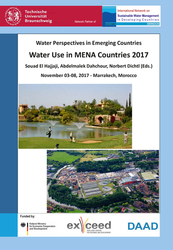| Areas | |
|---|---|
| Serie de libros (96) |
1378
|
| Nachhaltigkeit |
3
|
| Gesundheitswesen |
1
|
| Letra |
2364
|
| Ciencias Naturales |
5406
|
| Matemática | 229 |
| Informática | 319 |
| Física | 980 |
| Química | 1363 |
| Geociencias | 131 |
| Medicina humana | 243 |
| Estomatología | 10 |
| Veterinaria | 108 |
| Farmacia | 147 |
| Biología | 835 |
| Bioquímica, biología molecular, tecnología genética | 121 |
| Biofísica | 25 |
| Nutrición | 45 |
| Agricultura | 1004 |
| Silvicultura | 201 |
| Horticultura | 20 |
| Ecología y conservación de la tierra | 148 |
| Ciencias Ingeniería |
1793
|
| General |
98
|
|
Leitlinien Unfallchirurgie
5. Auflage bestellen |
|
Erweiterte Suche
Water Use in MENA Countries 2017 (Tienda española)
Water Perspectives in Emerging Countries, November 03-08, 2017 - Marrakech, Morocco
Müfit Bahadir (Editor)Previo
Lectura de prueba, PDF (370 KB)
Indice, PDF (130 KB)
Water is an indispensable element for human life. However, clean water supply is a worldwide issue nowadays. This is because of pollution due to anthropogenic activities that are related to the increase of human population. The man-induced inputs as important sources of pollution contribute to the contamination of water quality in rivers and reservoirs. These pollutants include domestic organic wastes, industrial wastes, heavy metals, oil and grease, polycyclic aromatic hydrocarbons, endocrine disrupting chemicals, persistent organic pollutants, etc., which can deteriorate the natural chemistry of water. Monitoring the pollutant levels in water bodies is an important issue, since their elevated levels could be hazardous to biota that live in the water body and the sedimentary compartment of the aquatic ecosystems, partly or mostly being the natural resources in the food chain up to human being.
Therefore, water pollution will always remain a never-ending story, today’s society will be faced with. To conclude, the aim of this workshop was to update the knowledge on water related issues and to discuss practical solutions to reduce (if even not to stop) water pollution while integrating experts from technological, environmental and social-economic fields.
| ISBN-13 (Impresion) | 9783736997493 |
| ISBN-13 (E-Book) | 9783736987494 |
| Formato | B5 |
| Idioma | Inglés |
| Numero de paginas | 318 |
| Laminacion de la cubierta | mate |
| Edicion | 1. |
| Lugar de publicacion | Göttingen |
| Fecha de publicacion | 08.03.2018 |
| Clasificacion simple | Proceeding |
| Area |
Agricultura
|
| Palabras claves | Water perspectives, emerging countries, water sources, water pollution, solutions |








